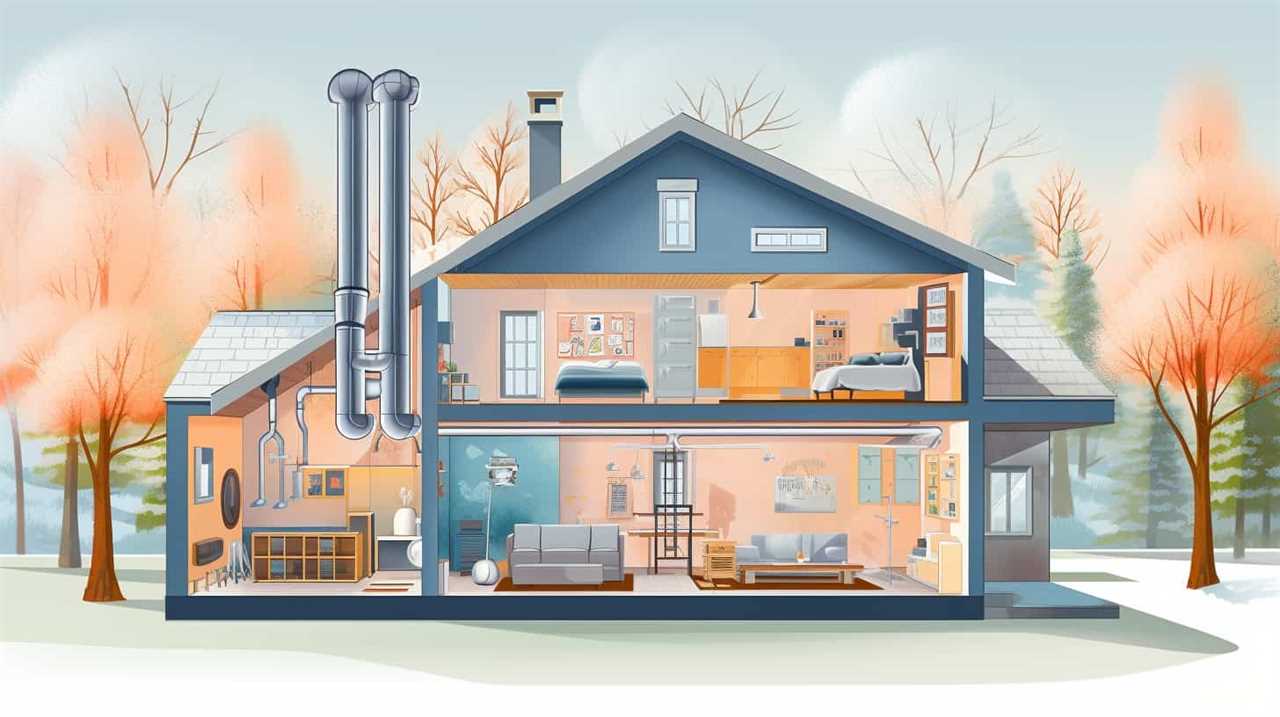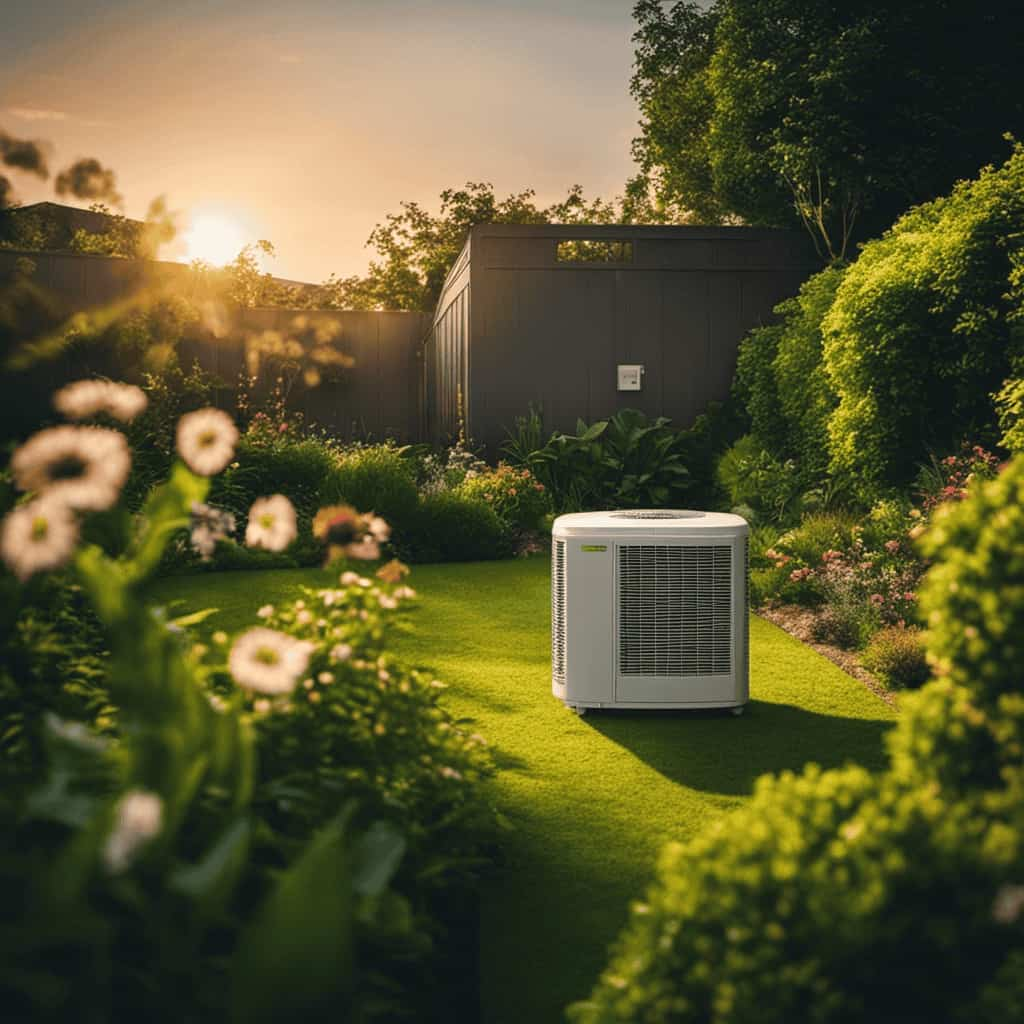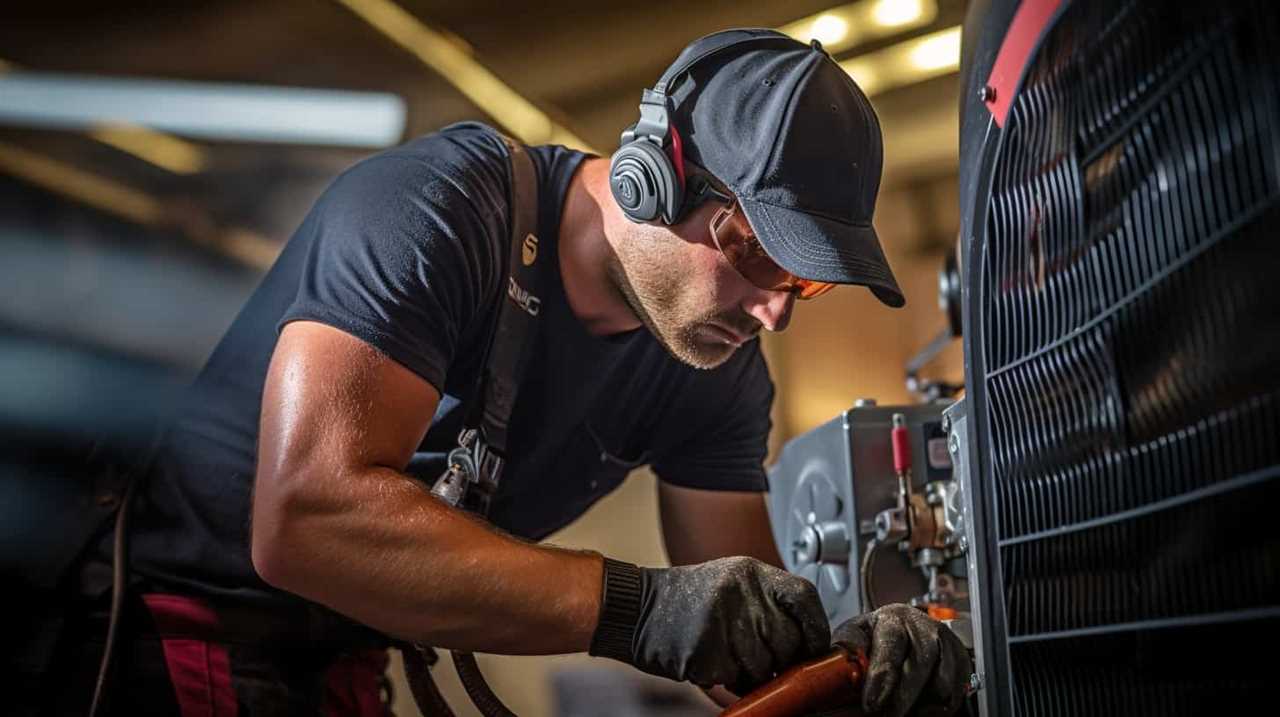We’ve all heard about energy efficiency ratings for heat pumps, but understanding them can be overwhelming. This is where we can help.
In this article, we’ll unravel the mysteries behind SEER and HSPF ratings, explore the factors that affect energy efficiency, and compare EER vs. COP ratings.
Get ready to maximize your heat pump’s efficiency with our expert tips. Get cozy, because we’re about to dive deep into the world of heat pump energy efficiency.
Key Takeaways
- Energy efficiency ratings in heat pumps are important for reducing energy consumption and lowering utility bills.
- Understanding SEER and HSPF ratings helps determine the cooling and heating efficiency of heat pumps.
- Factors such as the size of the heat pump, climate conditions, and proper installation and maintenance can affect energy efficiency.
- Comparing energy efficiency ratings like EER and COP helps determine the overall efficiency and performance of heat pumps.
The Importance of Energy Efficiency Ratings in Heat Pumps
We believe that understanding energy efficiency ratings is crucial for homeowners considering heat pumps.

The benefits of heat pump energy efficiency are manifold. By choosing a heat pump with a high energy efficiency rating, homeowners can significantly reduce their energy consumption and lower their utility bills.
The impact of energy efficiency ratings on energy savings can’t be overstated. A heat pump with a higher efficiency rating will require less electricity to operate, resulting in substantial cost savings over time.
Additionally, a more efficient heat pump will also have a lower environmental impact, reducing greenhouse gas emissions and promoting sustainability.
Therefore, it’s imperative for homeowners to carefully consider the energy efficiency ratings of heat pumps to maximize their energy savings and contribute to a greener future.

Understanding SEER and HSPF Ratings for Heat Pumps
Understanding SEER and HSPF ratings for heat pumps is essential for homeowners who want to make informed decisions about their energy-efficient heating and cooling options. To help you navigate the world of heat pump efficiency standards and interpreting heat pump ratings, here are some key points to consider:
- SEER (Seasonal Energy Efficiency Ratio) measures the cooling efficiency of a heat pump.
- HSPF (Heating Seasonal Performance Factor) measures the heating efficiency of a heat pump.
- Higher SEER and HSPF ratings indicate greater energy efficiency.
- SEER and HSPF ratings are determined by standardized tests conducted by manufacturers.
- It’s important to compare SEER and HSPF ratings when choosing a heat pump to ensure optimal energy savings.
Factors Affecting Heat Pump Energy Efficiency
One key factor that affects heat pump energy efficiency is the size of the unit relative to the space it is intended to heat or cool. If the heat pump is too small for the area, it will have to work harder and consume more energy to reach the desired temperature. On the other hand, if the heat pump is too large, it may cycle on and off frequently, leading to inefficient operation and increased energy consumption.
Another factor that impacts heat pump energy efficiency is the climate in which it operates. Heat pumps are designed to work most efficiently within certain temperature ranges. In colder climates, the heat pump may need to rely on auxiliary heating, such as electric resistance heating, which can lower its overall energy efficiency. Similarly, in extremely hot climates, the heat pump may struggle to cool the space efficiently, leading to decreased energy efficiency.
To better understand the factors affecting heat pump energy efficiency, let’s take a look at the following table:

| Factor | Impact on Energy Efficiency |
|---|---|
| Size of the heat pump | Too small or too large can decrease efficiency |
| Climate conditions | Extreme temperatures can decrease efficiency |
| Proper installation and maintenance | Proper installation and regular maintenance can optimize efficiency |
Understanding these factors is crucial to ensure optimal heat pump performance and energy efficiency. Now, let’s delve into comparing energy efficiency ratings: eer vs. cop.
Comparing Energy Efficiency Ratings: EER Vs. COP
Let’s compare the energy efficiency ratings of EER and COP to determine their differences and implications for heat pump performance.
-
EER (Energy Efficiency Ratio) measures the cooling capacity of a heat pump divided by the electrical power input. It’s commonly used to evaluate the efficiency of air conditioners in cooling mode.
-
COP (Coefficient of Performance) measures the ratio of heat output to the amount of energy input. It’s used to evaluate the efficiency of heat pumps in both heating and cooling modes.

EER focuses solely on cooling efficiency, while COP takes into account both heating and cooling efficiency.
EER is a more straightforward and easily understood rating, while COP provides a more comprehensive evaluation of a heat pump’s overall performance.
When comparing heat pumps, a higher EER or COP rating indicates greater energy efficiency and potentially lower operating costs.
Tips for Maximizing Heat Pump Energy Efficiency
To optimize heat pump energy efficiency, we recommend regularly maintaining and cleaning the system. This will ensure that the heat pump is running at its peak performance and will help maximize its energy-saving capabilities. Regular maintenance includes checking and replacing air filters, cleaning coils, and inspecting the refrigerant levels. By doing so, you can prevent any potential issues that may arise and affect the heat pump’s efficiency.

Additionally, it’s important to properly insulate your home to minimize heat loss and maximize the heat pump’s performance. This can be done by sealing any air leaks and adding insulation to walls, floors, and ceilings.
Frequently Asked Questions
How Do Heat Pump Energy Efficiency Ratings Compare to Other Types of Heating and Cooling Systems?
Heat pump energy efficiency ratings, compared to traditional HVAC systems, depend on factors such as climate, insulation, and system size. Understanding these ratings helps us choose the most efficient and cost-effective heating and cooling solution.
Are There Any Government Incentives or Rebates Available for Purchasing Energy-Efficient Heat Pumps?
Yes, there are government incentives and rebates available for purchasing energy-efficient heat pumps. These incentives aim to encourage the adoption of energy-efficient technologies and reduce greenhouse gas emissions.
Can a Heat Pump’s Energy Efficiency Rating Change Over Time?
Yes, a heat pump’s energy efficiency rating can change over time due to factors such as wear and tear, maintenance, and technological advancements. The lifespan of a heat pump also affects its energy efficiency.

How Does the Size and Location of a Heat Pump Affect Its Energy Efficiency?
The size and location of a heat pump have a significant impact on its energy efficiency. The size determines its performance, while the location affects its ability to withstand weather conditions.
Are There Any Maintenance Tasks or Regular Checks That Can Help Improve a Heat Pump’s Energy Efficiency?
Regular maintenance tasks, such as cleaning or replacing air filters and checking for refrigerant leaks, can help improve a heat pump’s energy efficiency. These simple checks ensure optimal performance and prevent any potential issues.
Conclusion
In conclusion, understanding and comparing energy efficiency ratings for heat pumps is crucial for maximizing their performance. By grasping the significance of SEER and HSPF ratings, as well as considering factors that affect energy efficiency, users can make informed decisions when choosing a heat pump.
Additionally, comparing energy efficiency ratings such as EER and COP allows for a comprehensive evaluation of different models. By implementing these tips and techniques, users can unlock the full potential of their heat pumps and enjoy efficient heating and cooling solutions.










